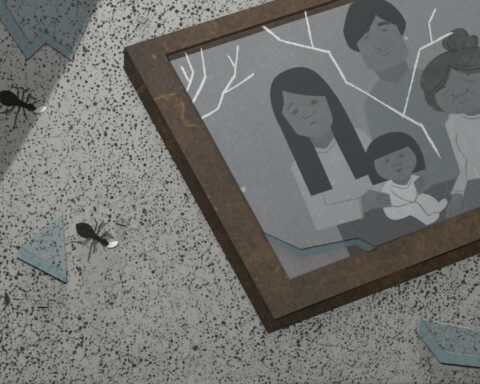It might be a truncated Oscar race, but many of the films in contention for Best Documentary Feature have been working the circuit for over a year. Three of the Oscar-nominated feature docs got their starts at last year’s Sundance Film Festival: American Factory, The Edge of Democracy, and Honeyland. For Sama followed shortly thereafter with acclaimed screenings at SXSW, Hot Docs and Cannes, while The Cave cinched the last nomination–something that seems to be reserved for the People’s Choice Award for Documentary at the Toronto International Film Festival, which the film handily won. When it comes to documentaries, the Oscar race is a marathon that only stops running when the envelope is opened.
This year’s field of nominees continues the tradition of giving the presumed front-runner the cold-shoulder. After omitting Brett Morgen’s Jane and Morgan Neville’s Won’t You Be My Neighbor? in previous years, the doc branch proved it wouldn’t be outdone by the actors’ snubbing of Jennifer Lopez and decided to overlook the showy box-office bonanza of Apollo 11 in lieu of smaller fare. While Apollo 11 is an astonishing achievement and would have been a worthy choice, it’s hard to make a case against any of the nominated documentaries.
The five films nominated for Best Documentary Feature generally reflect the state of the art in this era of increased popularity for the form. They are bold, urgent, and engaged films. The docs also represent the most internationally diverse field of the nominees outside of the Best International Feature category, of which one history-making film is also a part. Whatever lags the other branches of the Academy have in recognizing stories and voices outside the status quo, the documentary voters are doing their homework. Perhaps they benefit from the year-long grind in which the contenders are ever-present in festivals and coverage.
To help readers navigate their Oscar pools, POV is pleased to revisit the nominees for Best Documentary Feature and Best Documentary (Short Subject). May all the contenders enjoy a well-deserved rest on February 10.
BEST DOCUMENTARY FEATURE
American Factory
Steven Bognar and Julia Reichert follow up their 2009 Oscar nominee The Last Truck as a Chinese corporation revitalizes the former General Motors plant of Moraine, Ohio. The filmmakers embed themselves in the factory and witness a collision of cultures. This immersive film captures perspectives of American and Chinese employees with laudable access. American Factory asks what chance remains for the American Dream as the windshields of Fuyao Glass shatter alongside the renewed hopes of its employees.
If members of the Academy want an artfully composed documentary with a fiery socialist spirit, this is it. American Factory presents the ultimate impression of “objectivity” one could hope to find in a documentary: the balance is central to the film’s strategy. Reichert and Bognar witness a deeply rooted conflict and widening rich/poor gap between the Chinese owner’s minions and their American workers. Any foreseeable solution to the economic and cultural disparities that American Factory observes requires an entire ideological shift to realize. Many industry peers recognize the film’s impact and bravura filmmaking. America Factory is arguably the frontrunner with industry wins from the Directors’ Guild of America and the Cinema Eye Honors, along with a directing prize from Sundance and awards from numerous critical circles including the Toronto Film Critics Association and the Los Angeles Film Critics Association. – Pat Mullen
The Cave
Feras Fayyad, previously nominated for an Oscar for Last Men in Aleppo, returns to the Awards ceremony with The Cave, yet another compelling doc, this time about a hospital staff trying to save lives in war-ravaged Syria. The Cave is a twisting network of tunnels, which shields some of the equipment necessary for the hospital to operate. In a violent environment where Russia’s jets are bombing constantly, the Cave—situated in a suburb of Damascus—is barely surviving.
Fayyad’s choice of a protagonist is brilliant: Amani Ballour, a paediatrician in her late 20s, who has become the hospital’s manager. Syrian men, even in times of combat, are forced to struggle with Ballour’s power, unique in her society, and it sometimes takes a male member of her staff to stand up for her. Ballour’s calm manner, even in constantly tense situations, truly makes her the film’s heroine.
Eventually, chemical weapons are deployed against the Cave, injuring and killing children, mothers and elders. Ballour and her staff are forced to consider leaving a place where they have done wonderful work. Fayyad’s film, with its admirable female lead amid a riveting tale about trying to keep a hospital going in wartime, is just the kind of material that the Academy voters love. – Marc Glassman
The Edge of Democracy
Critics often write that a filmmaker was the perfect person to have made a doc or fiction feature. In the case of Petra Costa and Edge of Democracy, she’s the only one who could have made the film. The charismatic, immensely talented Brazilian director’s grandparents are part of the country’s right-wing elite, having made a fortune in the construction business. Her parents were the exact opposite politically, being Marxist revolutionaries. In a country of extreme divisions, Costa is a rare bird, someone with access to and understanding of the Workers’ Party of Luiz Inacio Lula da Silva—best known as Lula—and his successor Dilma Rousseff and also of the current fascist-leaning Alliance for Brazil party, run by the current President Jair Bolsonaro.
In her own voiceover, Costa is able to guide her audience through her personal story as a leftist born with privilege who is able to gain access to figures on both the right and the left. What makes her film so intriguing for Oscar voters is that Brazil’s recent political history is an intensified version of the rivalry between Trump and the Clintons. Lula and Dilma were liberals whose reform movement was corrupted by the Democratic Movement Party, which Costa calls Brazil’s “oldest oligarchy.” Both were brought down by charges of fraud and unethical behaviour—in Brazil “lock her up” is real. And in Bolsonaro, Brazil may have found the one person more abusive and narcissistic than Trump. It’s the U.S as a horrifying graphic novel. – Marc Glassman
Honeyland
Honeyland is the bees’ knees. Its success is a testament to the growing popularity of documentary and the open-mindedness of audiences at festivals worldwide. One can only imagine the laugh that American distributor Neon had when its underdog Honeyland landed two Academy Award nominations and its presumed frontrunner Apollo 11 got shut-out. Who would ever have imagined that a Macedonian doc about a beekeeper would be the breakout buy from Sundance?
Honeyland is an astonishing little movie that went the distance. After wowing audiences at Sundance where it won three awards including the Grand Jury prize, Honeyland proved to have a bigger reach than any other film that debuted at the festival. It’s a strikingly shot film — Honeyland’s honours on the awards circuit include the inaugural doc prize from the American Society of Cinematographers — and a startlingly poignant essay on sustainability. This intimate character study is one of the most positive environmental films in recent memory. Honeyland invites audiences to see in beekeeper Haditze Muratova the impact that one environmental-conscious person can have on the world. Ljubomir Stefanov and Tamara Kotevska’s film is the wild card of the race. Honeyland has a history-making pair of nominations that afford it the distinction of being the first film nominated for Best Documentary Feature and Best International Feature. While it will inevitably lose the latter award to Parasite, this privilege affords a healthier dose of “buzz” that could bring Honeyland Oscar gold. – Pat Mullen
For Sama
How does one watch For Sama and not be in awe of its bravery? This debut feature by Waad al-Kateab and Edward Watts is a true example of courage under fire. The film features harrowing footage shot by al-Kateab from ground zero in Aleppo during the thick of the revolution in Syria. As al-Kateab, then a journalist, captured shots of everyday people surviving relentless violence, her responsibilities doubled when she learned that she was pregnant. Bound by her duties to both her daughter and her country, the director proved resolutely strong while fearlessly documenting the resilience of Syrians resisting the regime. For Sama is not an easy film to witness, but it rewards ten-fold. It’s simply astonishing to watch the footage that al-Kateab gets from the thick of the action, capturing life, death, hope, and heartache as she ensures that the voices of her people are not forgotten.
The doc proves that a hidden gem can break through with the Academy, as noted by the upwards rise of its festival run. People noticed For Sama when it eclipsed the music docs at a second-tier festival like SXSW, winning both the Grand Jury Prize and Audience Award, and then a special prize at Hot Docs only to upgrade to Cannes, the world’s most prestigious and notoriously doc-averse festival. Instead of being lost amidst the glitzy world premieres on the Croisette, For Sama won the l’Œil d’or for best documentary and continues to move audiences at festivals worldwide. This coup de coeur is hard to ignore. – Pat Mullen
Will Win
Marc says: Honeyland. It’s a strange and truly unique film, worthy of nominations in both the Foreign Film and Doc Feature categories. Set in Macedonia, an area of the world that few have encountered, it’s properly exotic in a way that will be appealing to the Academy voters. Unlike war-torn Syria, strife laden Brazil, or the American rust belt, Honeyland presents us with an ancient land, enmeshed with traditions, and a woman, who is surviving by her abilities in working with bees. There’s enough conflict from neighbours to make the film compulsively watchable while an ecological message—beloved by the Academy—can quietly work its magic.
Pat says: American Factory. The film presents Julia Reichert’s fourth nomination and one could feel momentum building for American Factory since its victorious Sundance debut. In addition to being an all-around excellent film, American Factory seems like the default favourite now that Apollo 11 is out of the race. The stats support it and it has the most muscle behind it, including Netflix’s massive PR team and Barack and Michelle Obama, who got behind American Factory as the inaugural doc for their production company Higher Ground. It’s also just a fitting choice that captures the pushback against Trump’s America as citizens (and voters) ask what hope exists for change. Don’t count out For Sama, though. That film is an astonishing act of courage and likely to capture the heart of everyone who sees it.H
Should Win
Marc says: Love Honeyland — and For Sama! Since I’m picking Honeyland to win, I can certainly make a case that For Sama also deserves the Oscar. Both Honeyland and For Sama are films about women and their families. And both films were co-directed by women. Each woman has their family as the motivating factor for their decisions: in one case, to have stayed in Macedonia to take care of a mother; in the other, to leave her beloved Syria for an even more adored child. These are documentaries about true emotions, ones that audiences worldwide—including in Hollywood—can understand and admire.
Pat says: I really admire all five of these films, but the decision between American Factory and For Sama is the “Sophie’s Choice” dilemma of the ballot. I have to give the edge to American Factory, simply for the revelatory portrait of a nation at a crossroads it finds through the access and proximity that Reichert and Bognar get to their subjects. But I’ll be overjoyed if For Sama pulls an upset victory.
Should have been there
Marc says: Apollo 11. Don’t get me wrong. I don’t think Todd Douglas Miller’s doc should win the Oscar. But the film deserves a nomination. It’s a meticulously researched documentary, which evokes an adventurous past, when the Cold War’s most endearing battle, the Space Race, was still taking place between the U.S. and the Soviet Union. For those of us who love archival work — and I am one of them — Apollo 11 is a brilliant example of how to mine the vaults. With the complete cooperation of NASA and US National Archives, Miller and his team were able to use over 11, 000 hours of uncatalogued audio and film to make a totally authentic time capsule of what happened when “mankind” first walked on the Moon.
Pat says: As much as I like all five films, the category doesn’t include 2019’s best doc: One Child Nation. The powerful film by Nanfu Wang and Jialing Zhang simply eclipsed every doc last year with its emotional and intellectual impact. The film’s study of China’s One-Child Policy and a nation’s complicity and guilt offered a portrait of a collective reckoning. It’s also valuable as a study in systemic misogyny as Wang’s journey confronts cultural values that prize the lives of men over the lives of women as parents want their family name to endure. Despite making the 15-film Oscar shortlist, One Child Nation came up short and deserved a stronger campaign that better articulated its artistic pedigree and emotional urgency.
BEST DOCUMENTARY (SHORT SUBJECT)
The nominees: In the Absence, Learning to Skateboard in a Warzone (If You’re a Girl), Life Overtakes Me, St. Louis Superman, Walk Run Cha-Cha
Read our reviews of the Oscar-nominated short docs here.
Will Win
Marc says: St. Louis Superman. Co-directed by Canadian Sami Khan, this stirring biopic benefits from a charismatic doc “performance” by its lead, politician-activist-rapper Bruce Frank, Jr. an African American from Ferguson who shows that Black Lives do Matter.
Pat says: Learning to Skateboard in a Warzone… is very uplifting. Its “you go, girl!” spirit should swing some easy votes even though it’s a bit too soft and conventional for my liking. It’s not exactly on par with recent winners like The Girl in the River or Period. End of Sentence, which offered similar portraits of women’s rights with greater heft. But the shorts and doc prizes are admittedly one of the few categories that voters can recognize diverse voices for quality work.
Should Win
Marc says: St. Louis Superman but I’ll play along and reverse Pat’s call. My second choice is Learning to Skateboard in a Warzone, which is too soft but does document how some Afghan girls are having fun while learning how to read and write—tools they’ll need in ever changing Kabul.
Pat says: St. Louis Superman perfectly captures the moment and the struggle for change. The question “who is your subject?” fuels many doc pitches and industry sessions and directors Sami Khan and Smriti Mundhra offer a character study to which many filmmakers should aspire. Their portrait of Ferguson activist turned politician Bruce Franks, Jr. uses a compelling subject to capture a wider struggle with universal themes.
Tune in Sunday, Feb. 9 to see who wins the doc Oscars and join POV on Twitter for the show!












